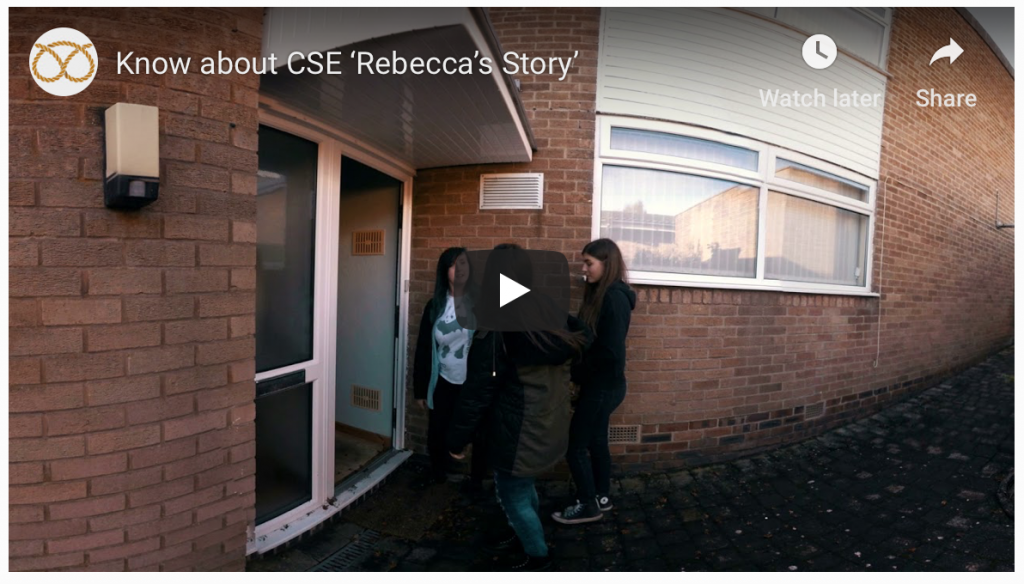SCHOOLS.
Unhealthy relationships and relationship abuse
All teachers understand that a young person being in an unhealthy relationship can lead to abuse of many different types: controlling behaviour, emotional, financial, psychological abuse and more.
Free teaching resources are available on sexting, consent and preventing relationship abuse from the Home Office’s Disrespect Nobody campaign. The Home Office has worked with the PSHE association to develop the materials: :
New materials for keeping children safe at parties
A new interactive for schools will soon be available to help young people stay safe at parties. More ‘Grooming parties’ are happening across the country and more young people are finding themselves being groomed and exploited in this way.
Sign up to get free Rebecca’s Story resources here

It’s everyone’s responsibility
If you work or come into contact with young people in a school setting, whether in an employed or voluntary capacity, then you have a duty of care towards them.
It is your responsibility to make sure that you:
Act on it! Report it!
- Use your safeguarding policy and procedures – and remember, if you feel something’s not right, it probably isn’t.
- Talk to your Designated Safeguarding Lead.
- Complete the CSE Risk Factor Matrix together if you have concerns someone may be at risk of or experiencing child sexual exploitation
- Listen to the child and if you have any concerns, do what is needed to help them.
- If you consider the child to be at risk of harm through sexual exploitation, refer to First Response immediately on 0300 1313 126
Can you help the child yourself?
- If the child is at low risk, it may be too early to refer the case on. It may be that providing advice and guidance, or other early intervention to a child, young person and/or family to help them stay safe, is more appropriate.
- With parental consent or the consent of the young person themselves, a single agency or group of agencies can do this via an Early Help Assessment (EHA) or with the help of your Local Support team (LST)
- If you are in any doubt, or if a young person is at an immediate risk, you should refer the case to: First Response in Staffordshire on 0800 1313 126 or Safeguarding and Referral Team on 01782 235100 in Stoke on Trent, following consultation with your own Safeguarding Lead or designated person.
If the child is at risk of harm or there are wider concerns:
- Call Catch22 for advice on 01782 237106
- Refer the case to First Response in Staffordshire on 0800 1313 126
- Refer the child to a multi-agency CSE Panel for support
- Contact Staffordshire Police on 101, or 999 in an emergency.
Sexual Consent and Young People
Someone consents only if they agree by choice and they have the freedom and capacity to make that choice.
Consent may be given to one type of sexual activity but not another.
Consent can be withdrawn at any time during sexual activity and each time activity occurs.
Sexual Consent and Young People
Further Resources to help you
Resources for schools
Share Aware Guide - a PDF guide produced to empower parents to keep their children safe online.NetAware - a comprehensive guide for parents on over 50 of the top social networks, apps and games that young people use.
Talking to Your Child About Staying Safe Online - advice and tips from the NSPCC on how to have effective conversations with your children about an array of online topics, including cyberbullying, online porn, and sharing images and information.
Parental Controls - information on how parental controls can be used to help keep children safe online.
Teaching Materials
NSPCC Teaching Materials - Resources to support teachers to deliver online safety lessons to children aged 8-12.Help for Young People
Online grooming - an advice page, looking at what online grooming is, how it happens, and what you can do to keep yourself safe.Sexting - information on what sexting is, what the risks are, and what you can do if someone sends you a picture or asks for one.
Mobile phone safety - an advice page, focusing on how to use your phone safely. It covers what you should do if you are being bullied through your mobile or being pressured to share your phone number.
Online gaming - ChildLine content, giving advice on how to stay safe when gaming. It discusses voice chat, online bullying, and how to keep a record of abusive messages.
Use the right language
Download the ‘Appropriate Language: Child sexual and/or Criminal Exploitation, Guide for Professionals’ to get tips to support the child in the best way.
Stop the Trafficking leaflets
Five leaflets targeted at young people to help them recognise if they are being exploited, living in slavery or being trafficked.
